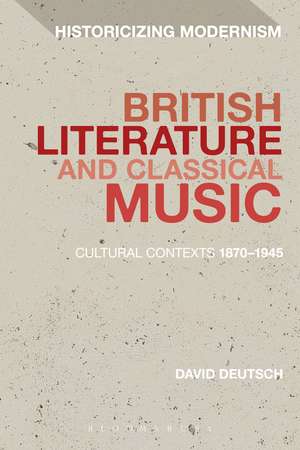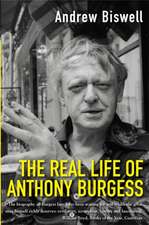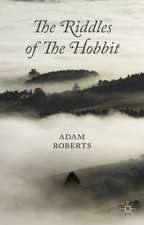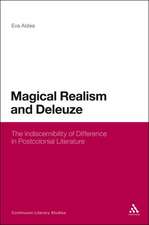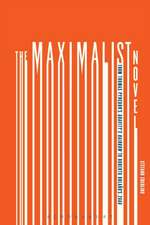British Literature and Classical Music: Cultural Contexts 1870-1945: Historicizing Modernism
Autor Dr David Deutschen Limba Engleză Paperback – 22 mar 2017
| Toate formatele și edițiile | Preț | Express |
|---|---|---|
| Paperback (1) | 257.97 lei 6-8 săpt. | |
| Bloomsbury Publishing – 22 mar 2017 | 257.97 lei 6-8 săpt. | |
| Hardback (1) | 716.00 lei 6-8 săpt. | |
| Bloomsbury Publishing – 23 sep 2015 | 716.00 lei 6-8 săpt. |
Din seria Historicizing Modernism
- 14%
 Preț: 540.31 lei
Preț: 540.31 lei - 30%
 Preț: 600.06 lei
Preț: 600.06 lei - 30%
 Preț: 602.11 lei
Preț: 602.11 lei -
 Preț: 447.42 lei
Preț: 447.42 lei - 30%
 Preț: 715.42 lei
Preț: 715.42 lei - 30%
 Preț: 509.93 lei
Preț: 509.93 lei - 13%
 Preț: 237.84 lei
Preț: 237.84 lei - 22%
 Preț: 259.07 lei
Preț: 259.07 lei - 13%
 Preț: 255.76 lei
Preț: 255.76 lei - 22%
 Preț: 777.06 lei
Preț: 777.06 lei - 22%
 Preț: 257.68 lei
Preț: 257.68 lei - 13%
 Preț: 256.12 lei
Preț: 256.12 lei - 22%
 Preț: 258.59 lei
Preț: 258.59 lei - 13%
 Preț: 256.29 lei
Preț: 256.29 lei - 13%
 Preț: 258.42 lei
Preț: 258.42 lei - 30%
 Preț: 716.56 lei
Preț: 716.56 lei - 22%
 Preț: 232.34 lei
Preț: 232.34 lei - 22%
 Preț: 257.32 lei
Preț: 257.32 lei - 13%
 Preț: 228.85 lei
Preț: 228.85 lei - 30%
 Preț: 657.22 lei
Preț: 657.22 lei -
 Preț: 259.07 lei
Preț: 259.07 lei - 13%
 Preț: 258.42 lei
Preț: 258.42 lei - 22%
 Preț: 258.42 lei
Preț: 258.42 lei - 13%
 Preț: 257.03 lei
Preț: 257.03 lei - 30%
 Preț: 717.05 lei
Preț: 717.05 lei - 13%
 Preț: 256.20 lei
Preț: 256.20 lei - 22%
 Preț: 259.25 lei
Preț: 259.25 lei - 30%
 Preț: 773.81 lei
Preț: 773.81 lei -
 Preț: 237.75 lei
Preț: 237.75 lei - 23%
 Preț: 236.27 lei
Preț: 236.27 lei - 13%
 Preț: 257.12 lei
Preț: 257.12 lei
Preț: 257.97 lei
Preț vechi: 295.64 lei
-13% Nou
Puncte Express: 387
Preț estimativ în valută:
49.37€ • 53.61$ • 41.47£
49.37€ • 53.61$ • 41.47£
Carte tipărită la comandă
Livrare economică 22 aprilie-06 mai
Preluare comenzi: 021 569.72.76
Specificații
ISBN-13: 9781350028463
ISBN-10: 1350028460
Pagini: 272
Dimensiuni: 156 x 234 x 23 mm
Greutate: 0.39 kg
Ediția:NIPPOD
Editura: Bloomsbury Publishing
Colecția Bloomsbury Academic
Seria Historicizing Modernism
Locul publicării:London, United Kingdom
ISBN-10: 1350028460
Pagini: 272
Dimensiuni: 156 x 234 x 23 mm
Greutate: 0.39 kg
Ediția:NIPPOD
Editura: Bloomsbury Publishing
Colecția Bloomsbury Academic
Seria Historicizing Modernism
Locul publicării:London, United Kingdom
Caracteristici
Draws on historical archives to explore lower middle and working class engagement with high culture through the two World Wars
Notă biografică
David Deutsch is Assistant Professor of English at the University of Alabama, USA.
Cuprins
Introduction: Approaches to Classical Music in British Literature, 1870-1945: Theory and Practice1. The Liberalization of Music in Aesthetic Literature: Pater and Oxford2. Modernism's Distinctive Musical Rhetoric: Eliot, Huxley, and Woolf3. The Musical Refinement of the Lower-Middle and Working Classes: Bennett, Lawrence, and their Contemporaries4. Distinguishing a Musical Homoeroticism: Pater, Forster, and Their Aesthetic Descendants5. Classical Music, Cosmopolitanism, and War: From Authors to AudiencesConclusion: A Literary Coda: Classical Music in British LiteratureWorks CitedIndex
Recenzii
Deutsch writes about music, chiefly German, that evoked transcendental ideas in British literati, while deftly crossing lines of class, education, and sexual orientation . Deutsch's argument is vitally important for showing how British listeners discovered a psychological release in the classical repertoire, enabling a "popular cosmopolitanism" that helped to "construct public sanctuaries amidst hostile crowds.
[A] deeply admirable study.
Extremely stimulating and well-informed ... [This] book offers a wealth of information and astute analyses on a too-rarely-tackled subject that gives a fascinating insight into the importance of musical issues in both literature and society.
Jazz is the musical style most often associated with modernism, but Deutsch (Univ. of Alabama) demonstrates that the roots of modernism are surely planted and bloom in classical music. Using the lens of New Historicism, the author examines music as an aesthetic trope in modernist literature to emphasize social reform and changing attitudes about sex, class, and gender. What he reveals demonstrates the reverberations of the new emphasis on the respectability of music education and the increased ability for all to attend musical performances. In the first chapter, Deutsch focuses on Walter Pater and the Oxbridge set. In the remaining four chapters, he considers Eliot's, Huxley's, and Woolf's use of musical allusion as a method of class critique; music education and the lower classes as seen through the work of Bennett, Burke, and Lawrence; classical music and tolerance of same-sex relationships; and the penetration of cosmopolitan ideas via the acceptance of European classical music. Proving that in this body of literature, music is integral rather than ancillary, Deutsch's volume merits serious attention. Summing Up: Recommended. Upper-division undergraduates through faculty.
David Deutsch's British Literature and Classical Music contributes valuably to a burgeoning conversation about the relationship between literature and music in the early twentieth century. ...his book is an important resource, built on an often-surprising archive.
Teachers as well as scholars of British literature looking for new perspectives will find Deutsch's very informative and detailed study a great boon, because it illuminates an often neglected and yet very important area of literary study and does so very well indeed.
A carefully researched and well-organised account of the importance of classical music in British literature ... A study that does so much to uncover how early 20th-century literary culture cultivated its appreciation for classical music is to be warmly welcomed.
[A] deeply admirable study.
Extremely stimulating and well-informed ... [This] book offers a wealth of information and astute analyses on a too-rarely-tackled subject that gives a fascinating insight into the importance of musical issues in both literature and society.
Jazz is the musical style most often associated with modernism, but Deutsch (Univ. of Alabama) demonstrates that the roots of modernism are surely planted and bloom in classical music. Using the lens of New Historicism, the author examines music as an aesthetic trope in modernist literature to emphasize social reform and changing attitudes about sex, class, and gender. What he reveals demonstrates the reverberations of the new emphasis on the respectability of music education and the increased ability for all to attend musical performances. In the first chapter, Deutsch focuses on Walter Pater and the Oxbridge set. In the remaining four chapters, he considers Eliot's, Huxley's, and Woolf's use of musical allusion as a method of class critique; music education and the lower classes as seen through the work of Bennett, Burke, and Lawrence; classical music and tolerance of same-sex relationships; and the penetration of cosmopolitan ideas via the acceptance of European classical music. Proving that in this body of literature, music is integral rather than ancillary, Deutsch's volume merits serious attention. Summing Up: Recommended. Upper-division undergraduates through faculty.
David Deutsch's British Literature and Classical Music contributes valuably to a burgeoning conversation about the relationship between literature and music in the early twentieth century. ...his book is an important resource, built on an often-surprising archive.
Teachers as well as scholars of British literature looking for new perspectives will find Deutsch's very informative and detailed study a great boon, because it illuminates an often neglected and yet very important area of literary study and does so very well indeed.
A carefully researched and well-organised account of the importance of classical music in British literature ... A study that does so much to uncover how early 20th-century literary culture cultivated its appreciation for classical music is to be warmly welcomed.
